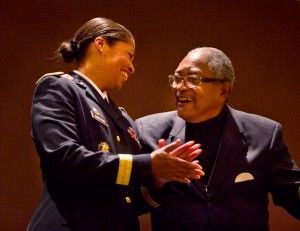Highest-ranking black woman in Army Reserve speaks on black history

February 21, 2012
One of first black marines also honored
The first black woman to hold the position of Major General in the United States Army Reserve, Maj. Gen. Marcia M. Anderson, said she credits her success to her family and blacks who have made military history.
As part of Black History Month, Anderson spoke at the Student Center Monday about the history of black women in the United States military.
Advertisement
While Anderson said she didn’t plan on joining the Army from a young age but actually joined to fulfill a college credit while she was pursuing her law degree at Rutgers University, she is today the highest-ranked black female in the Army
Reserve.
Anderson said although she wanted to speak about African-American women and the challenges they have faced in the military, women working in other areas faced similar hardships.
“Together they share pretty much the same story,” she said. “The bar was either set pretty low in terms of expectations for them, or the bar was set in some minds impossibly high where they couldn’t achieve their dreams.”
Anderson said the women before her who worked to face challenges made it possible for her to be where she is today.
During the Civil War, Anderson said, Susie Baker, who was born a slave, worked to help Union soldiers.
“Although she was only 14 years old at the time, she taught her husband and the soldiers how to read and write,” Anderson said. “She also learned how to load, clean and fire a pistol.”
Advertisement*
In World War I, Anderson said, black nurses established a larger presence in the Army.
“They trained black nurses enrolled in the Red Cross because they hoped to use that to gain entry into the Army,” she said. “As the war escalated, the pressure increased to enlist more black women. So finally, at the armistice, 18 black women were given assignments.”
Those women were only allowed to care for German prisoners of war and black soldiers, Anderson said.
By 1918, she said, more than 350,000 blacks had served in the war.
“They believed that if they served with dignity, that their courage and honor were going to help people like me,” Anderson said.
Anderson went on to tell the story of the 39 women who started the Women’s Army Corps but were placed into segregated living quarters, training and recreational facilities and mess halls.
She also spoke about the first female millionaire, who was black, and the first black female who ran for president in 1972.
“These women rebuked their place in society and showed their intellect and resourcefulness,” she said. “They defied the stereotypes of the day.”
Although the women Anderson described were a part of what made it possible for her to hold the rank in the Army that she does today, she said it was words of encouragement from her mother and grandmother that inspired her to pursue her dreams.
“(My mother) always told me I could do anything I desire,” she said. “If you have dreams and apply yourself, it doesn’t matter where you were born.”
Anderson’s uncle, the Rev. Joseph Brown, head of the Africana Studies Department at SIUC and chair of the Black History Month Committee, said Anderson’s attribution of her success to her family was something they shared.
“There was a rule in my family … ‘make yourself indispensable,'” he said.
Although Anderson’s presentation fit closely with the theme of Black History Month at SIUC, Brown said he was glad to have an array of speakers and events so far this February.
“When the theme came to us, ‘black women in American history and culture,’ it made perfect sense to have the kind of diverse representation this month,” he said.
In March, Anderson will begin working at the Pentagon as Deputy Chief of the Army Reserve.
The theme of black history and the military carried to the second half of the program, where a Carbondale native was honored for his achievements in working to desegregate the Marine Corps.
Brown introduced the Rev. Archibald Mosley, of Carbondale, one of the Montford Point Marines — some of the first black men to serve in the United State Marines.
“He showed up to desegregate the Marine Corps, officially and finally,” Brown said.
Anderson gave a Corps Commandant Gen. James F. Amos’s military coin to Mosley.
Mosley, will visit Washington D.C. later this year to receive the Congressional Medal of Honor for his service in the Montford Point Marines.
He said he hopes his grandchildren remember him for what he experienced.
“I’d like for them to know that their grandfather went into the Marine Corps unwanted, undesired and segregated, and my greatest statement is. They shot toward us as many bullets as anybody else could see, but the only difference in those bullets shot at us and shot at others … they did not say these bullets are for blacks and these bullets are for whites,” he said.
Advertisement








